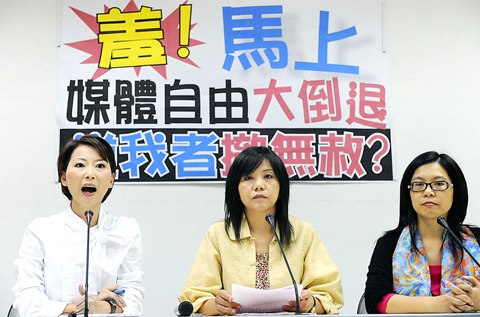Executive Yuan Spokesman Su Jun-pin (蘇俊賓) yesterday continued to protest against the nation’s poor press freedom ranking by Reporters Without Borders (RSF), saying that the review was “unacceptable.”
“We cannot accept [the organization’s] criticism that the government interfered with freedom of the press,” Su told reporters at the Executive Yuan.
“Members of the [Taiwanese media] can tell that none of the media outlets have been pressured for criticizing or questioning the government,” Su said.

PHOTO: CHIEN JUNG-FONG, TAIPEI TIMES
The spokesman said the government’s determination to protect press freedom in the nation remained unchanged.
The comments came after RSF’s latest press freedom ranking released on Tuesday.
Taiwan’s press freedom ranking slipped 23 spots to 59th place in the RSF’s report this year from 36th place last year.
Developing countries such as Mali and Haiti ranked higher than Taiwan.
This is the second drop in Taiwan’s press freedom rank since the Chinese Nationalist Party (KMT) regained power in May last year.
“The new ruling party in Taiwan tried to interfere in state and privately-owned media, while violence by certain activists further undermined press freedom,” RSF said on its Web site.
In May, the US-based Freedom House ranked Taiwan 43rd in its global survey, a drop of 11 spots from a year earlier, saying “media in Taiwan faced assault and growing government pressure.”
When asked for comment, KMT caucus secretary-general Lu Hsueh-chang (呂學樟) dismissed the significance of RSF’s evaluation, saying that it could only serve as a reference to the government at best. Lu said freedom of the press in Taiwan had been abused, adding that he hoped representatives from the RSF could visit Taiwan to gain a better understanding of Taiwan’s press freedom.
KMT Legislator Wu Yu-sheng (吳育昇) questioned whether RSF was politically biased.
The Democratic Progressive Party (DPP) caucus, meanwhile, yesterday accused the KMT administration of ruining the country’s journalistic credibility and said the government’s control over the media must stop immediately before Taiwan’s hard-won democracy is sabotaged.
Speaking at a press conference, DPP Lawmaker Yeh Yi-jin (葉宜津) lambasted the Government Information Office (GIO), saying sources show the GIO is planning to augment its control over the media by amending three laws on radio, cable television and satellite broadcasting.
The amendments would require all radio and television stations to re-apply for a broadcasting license every six years while the current law only requires the license to be renewed every six years, she said.
“We ask the GIO not to use Taiwan’s democracy as an excuse to influence the media. Changing the policy from renewal to reapplication is just a disguise for the government to extend its control over the media,” said Yeh, adding that such an amendment sends a message that only “obedient” media outlets would have a chance to survive.
Yeh also called GIO Chief Su Jun-pin a “liar” for his strong denial of the allegation.
“Don’t try to smart mouth us. Which media company hasn’t received a so-called ‘call of concern’ from the government?” she said.
Another DPP lawmaker, Kuan Bi-ling (管碧玲), also joined in the criticism, saying she was a victim of censorship when appearing on a political talk show. Kuan said she was asked by the station’s upper management to halt the discussion when she mentioned that the father-in-law of Vice Premier Eric Chu (朱立倫) had made a windfall in the stock market.
Also See: US free press rank jumps under Obama

A strong continental cold air mass is to bring pollutants to Taiwan from tomorrow, the Ministry of Environment said today, as it issued an “orange” air quality alert for most of the country. All of Taiwan except for Hualien and Taitung counties is to be under an “orange” air quality alert tomorrow, indicating air quality that is unhealthy for sensitive groups. In China, areas from Shandong to Shanghai have been enveloped in haze since Saturday, the ministry said in a news release. Yesterday, hourly concentrations of PM2.5 in these areas ranged from 65 to 160 micrograms per cubic meter (mg/m³), and pollutants were

Taiwan’s armed forces have established response protocols for a wide range of sudden contingencies, including the “Wan Chun Plan” to protect the head of state, the Ministry of Defense (MND) said today. After US President Donald Trump on Saturday launched a series of airstrikes in Venezuela and kidnapped Venezuelan President Nicolas Maduro, concerns have been raised as to whether China would launch a similar “decapitation strike” on Taiwan. The armed forces regularly coordinate with relevant agencies and practice drills to ensure preparedness for a wide range of scenarios, Vice Minister of National Defense Hsu Szu-chien (徐斯儉) told reporters before a

EVA Airways on Saturday said that it had suspended a pilot and opened an investigation after he allegedly lost his temper and punched the first officer several times as their plane was taxiing before takeoff at Los Angeles International Airport. According to a report published on Thursday by The Reporter, the incident occurred after the flight’s Malaysian first officer tried to warn the Taiwanese pilot, surnamed Wen (文), that he was taxiing faster than the speed limit of 30 knots (55.6kph). After alerting the pilot several times without response, the first officer manually applied the brakes in accordance with standard operating

Japanese Councilor Hei Seki (石平) on Wednesday said that he plans to visit Taiwan, saying that would “prove that Taiwan is an independent country and does not belong to China.” Seki, a member of the Japan Innovation Party, was born in Chengdu in China’s Sichuan Province and became a naturalized Japanese in 2007. He was elected to the House of Concilors last year. His views on the Chinese Communist Party (CCP) — espoused in a series of books on politics and history — prompted Beijing to sanction him, including barring Seki from traveling to China. Seki wrote on X that he intends